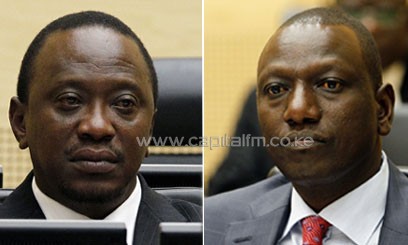
On Tuesday, Deputy-President William Ruto will be in The Hague to face three counts of crimes against humanity/CFM
Should Kenya choose to leave the ICC – the first country potentially to do so – it will be more of a symbolic vote of defiance and would not affect upcoming trials of the East African nation’s leadership, since legal proceedings have already started.
On Tuesday, Deputy-President William Ruto will be in The Hague to face three counts of crimes against humanity for allegedly organising 2007-2008 post-election unrest that killed at least 1,100 people and displaced more than 600,000.
Ruto’s trial comes about two months ahead of that of President Uhuru Kenyatta, who faces five charges of crimes against humanity, including murder, rape, persecution and deportation.
Both Kenyatta and Ruto have said they will cooperate fully with the court and deny the charges against them. Also due to appear in The Hague is radio journalist Joshua arap Sang, accused of inciting violence.
Many Kenyan politicians have branded the ICC a “neo-colonialist” institution that only targets Africans, prompting the debate on a possible departure from the Rome Statute of the ICC.
“Any law in this country or internationally like the Rome Statute can be repealed and can be amended,” said Asman Kamama, one of the lawmakers supporting a pull-out.
“It is not cast in stone and we want to be the trail blazers in the continent.”
The Jubilee Coalition of Kenyatta and Ruto dominate both Kenya’s National Assembly and Senate.
The Hague-based court was set up in 2002 to try the world’s worst crimes, and countries voluntarily sign up to join.
Any actual withdrawal requires the submission of a formal request to the United Nations, a process that would take at least a year.
A withdrawal could however preclude the ICC from investigating and prosecuting any future crimes.
Cases could then only be brought before the court if the government decides to accept ICC jurisdiction or the UN Security Council makes a referral.
Amnesty International condemned the move.
“This move is just the latest in a series of disturbing initiatives to undermine the work of the ICC in Kenya and across the continent,” said Netsanet Belay, Amnesty’s Africa director.
The rights group called on “each and every parliamentarian to stand against impunity and reject this proposal,” warning that “a withdrawal would strip the Kenyan people of one of the most important human rights protections and potentially allow crimes to be committed with impunity in the future.”
Kenya’s 2007 elections were marred by allegations of vote rigging, but what began as political riots quickly turned into ethnic killings and reprisal attacks, plunging Kenya into its worst wave of violence since independence in 1963.
Kenyatta and Ruto were fierce rivals in the 2007 vote, but teamed up together and were elected in March in peaceful polls.











































